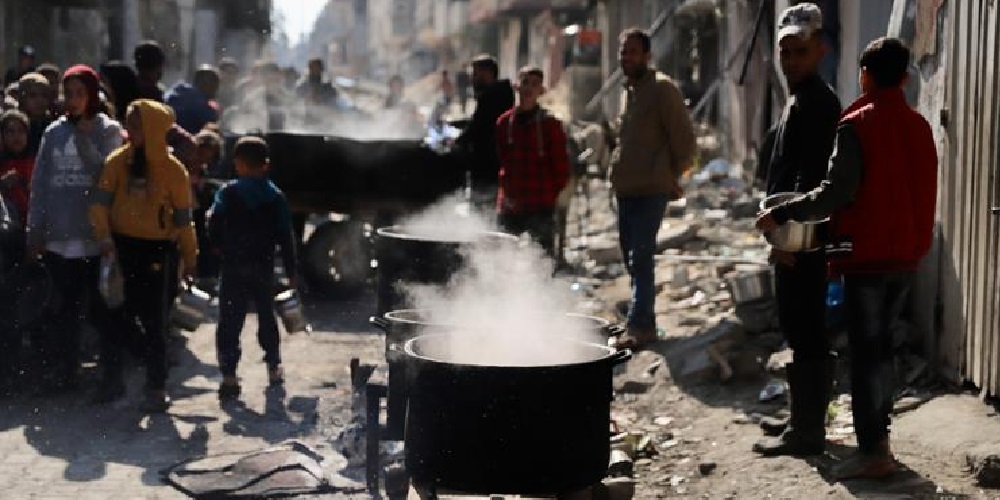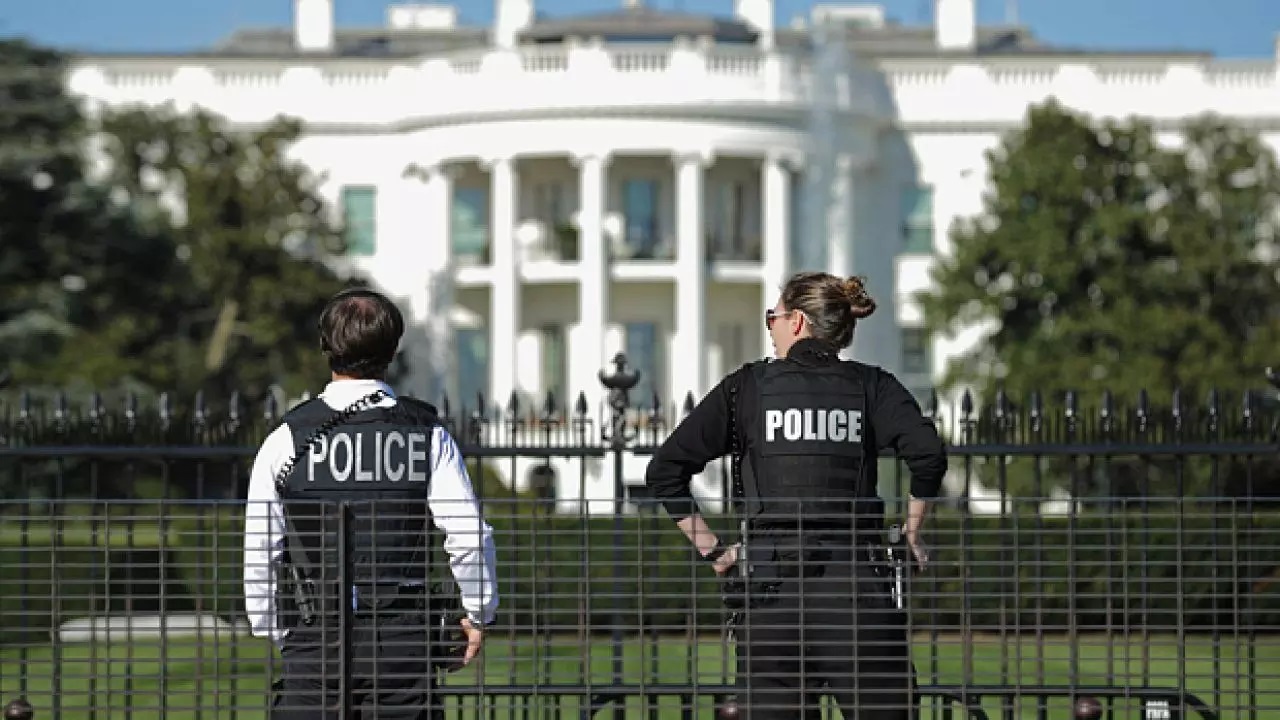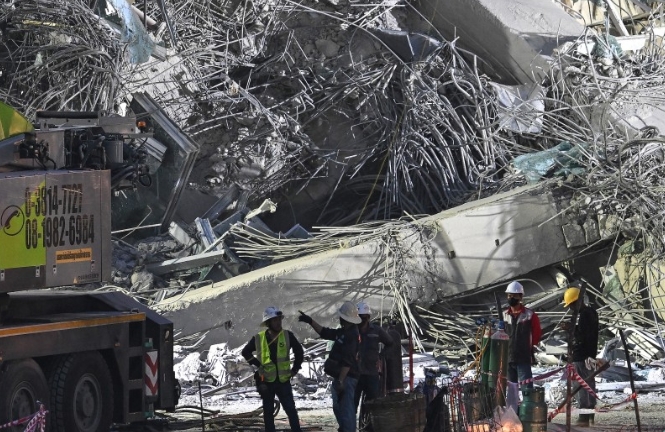Foreign
Israel Forces Fire On Gazans Rushing For Food Aid

Israeli forces in war-torn Gaza opened fire on Palestinians scrambling for food aid in a chaotic melee on Thursday that the health ministry in the Hamas-run territory said killed more than 100 people.
The Israeli military said a “stampede” occurred when thousands of desperate Gazans surrounded a convoy of 38 aid trucks, leading to dozens of deaths and injuries, including some who were run over by the lorries.
An Israeli source acknowledged troops had opened fire on the crowd, believing it “posed a threat”.
The Gaza health ministry condemned what it called a “massacre” in Gaza City in which 112 people were killed and more than 750 others wounded.
The incident adds to a Palestinian death toll from the war which the ministry earlier Thursday said had topped 30,000, and dampens hopes a truce deal between Israel and Hamas militants could be just days away.
There were conflicting reports on what exactly unfolded in the hours before dawn.
A witness in Gaza City, declining to be named for safety reasons, said violence unfolded when thousands of people rushed towards aid trucks at the city’s western Nabulsi roundabout, and soldiers fired at the crowd “as people came too close” to tanks.
Israeli army spokesman Daniel Hagari said the military had fired “a few warning shots” to try to disperse a crowd that had ambushed the aid trucks.
When the crowd got too big, he said the convoy tried to retreat and “the unfortunate incident resulted in dozens of Gazans killed and injured”.
Aerial images released by the Israeli army showed what it said were scores of Gazans surrounding aid trucks in Gaza City.
Ali Awad Ashqir, who said he had gone to get some food for his starving family, told AFP he had been waiting for two hours when trucks began to arrive.
“The moment they arrived, the occupation army fired artillery shells and guns,” he said.
The army spokesman Hagari later denied Israeli forces carried out any shelling or strikes at the time.
‘Another day from hell’
US President Joe Biden said Washington was checking “two competing versions” of the incident, while a State Department spokesman said the United States had been in touch with Israel and was “pressing for answers” on what happened.
The shooting incident would complicate efforts to broker a truce, Biden said, later admitting that any deal was unlikely to happen by Monday — the timeline that he had predicted earlier this week.
The US president spoke with Qatari and Egyptian leaders in separate phone calls, the White House said, saying he discussed both the ceasefire and the “tragic and alarming” aid incident.
The UN Security Council will hold a closed-door emergency meeting on the incident on Thursday afternoon.
Saudi Arabia strongly condemned what it called the “targeting” of unarmed civilians, while Kuwait and the UAE also issued condemnations.
Qatar warned that Israel’s “disregard for Palestinian blood… (will) pave the way for an expanding cycle of violence”.
Italy called for an immediate ceasefire in Gaza to facilitate more humanitarian aid.
Looting of aid trucks has previously occurred in northern Gaza, where desperate residents have taken to eating animal fodder and even leaves to try to stave off starvation, as aid groups warn of looming famine after nearly five months of war.
The chief of the United Nations agency for Palestinian refugees, UNRWA, said that no UN agency had been involved in Thursday’s aid delivery, and called it “another day from hell”.
Truce hopes
The war began on October 7 with an unprecedented Hamas attack on southern Israel that resulted in the deaths of around 1,160 people, mostly civilians, Israeli figures show.
Militants also took about 250 hostages, 130 of whom remain in Gaza, including 31 Israel says are presumed dead.
Israel’s retaliatory military campaign has killed 30,035 people, according to the Hamas-run Gaza’s health ministry.
Israel’s military says 242 soldiers have died in Gaza since ground operations began in late October.
Washington, a key ally of Israel, has been pushing for a reduction in civilian casualties and a ceasefire.
It has been working with mediators from Egypt and Qatar to seek a six-week pause in the war.
Negotiators had hoped a truce could begin by around March 10 or 11 when the Muslim holy month of Ramadan begins, depending on the lunar calendar.
The proposals reportedly include the release of some Israeli hostages held in Gaza by militants in exchange for hundreds of Palestinians held in Israeli prisons.
Short of the complete withdrawal Hamas has called for, a source from the group said the deal might see Israeli forces leave “cities and populated areas”, allowing the return of some displaced Palestinians and humanitarian relief.
Fears of famine
The World Food Programme has said Israel has blocked access for aid deliveries — which Israeli officials have denied — and warned that if nothing changes, “a famine is imminent in northern Gaza”.
As fighting continued in Gaza, Muhammad Yassin, 35, battled to find flour in Zeitun.
“We have not eaten a loaf of bread for two months,” he said. “Our children are starving.”
In the south, nearly 1.5 million people trying to flee the fighting are now packed into Rafah city, also short of food, as Israel threatens to send in troops against Hamas fighters.
Israeli Prime Minister Benjamin Netanyahu has come under increasing pressure to bring the remaining hostages home.
A group of 150 Israelis have started a four-day march from Reim, near the Gaza border, to Jerusalem, calling for the government to reach a deal.
Violence has also surged in the occupied West Bank, where two Israelis were killed on Thursday.
AFP
Foreign
U.S. prohibits personnel in China from romantic, sexual relationships with Chinese citizens

The U.S. government has banned American government personnel in China, as well as family members and contractors with security clearances, from any romantic or sexual relationships with Chinese citizens, The Associated Press has learned.
Four people with direct knowledge of the matter told the AP about the policy, which was put into effect by departing U.S. Ambassador Nicholas Burns in January shortly before he left China. The people would speak only on condition of anonymity to discuss details of a confidential new directive.
Though some U.S. agencies already had strict rules on such relationships, a blanket “non-fraternization” policy, as it is known, has been unheard of publicly since the Cold War. It’s not uncommon for American diplomats in other countries to date locals and even marry them.
A more limited version of the policy was enacted last summer prohibiting U.S. personnel from “romantic and sexual relations” with Chinese citizens working as guards and other support staff at the U.S. Embassy and five consulates in China. But Burns, the departing ambassador, broadened it to a blanket ban on such relations with any Chinese citizen in China in January, days before President Donald Trump took office. The AP was unable to determine exactly how the policy defined the phrase “romantic or sexual relationship.”
Two of the people with knowledge of the ban told the AP the new policy was first discussed last summer after members of Congress contacted Burns to express concern that restrictions on such relationships were not stringent enough. The House Select Committee on the Chinese Communist Party did not respond to a request for comment.
The new policy covers U.S. missions in mainland China, including the embassy in Beijing and consulates in Guangzhou, Shanghai, Shenyang and Wuhan, as well as the American consulate in the semi-autonomous territory of Hong Kong. It does not apply to U.S. personnel stationed outside China.
The only exception to the policy is U.S. personnel with pre-existing relations with Chinese citizens; they can apply for exemptions. If the exemption is denied, they must end the relationship or leave their position, the people said. Anyone who violates the policy will be ordered to leave China immediately.
The policy was communicated verbally and electronically to American personnel in China in January, but has not been publicly announced.
The State Department said it does not comment on internal matters. The National Security Council referred questions to the State Department. Burns, the former ambassador, did not reply to an AP request sent to his email address at The Cohen Group, a consultancy that he rejoined as vice chair in February.
Intelligence services across the world have long used attractive men and women to obtain sensitive information, famously during the Cold War. The State Department and other agencies with offices in China have long had stringent reporting requirements on personal relationships for American personnel stationed there, as well as rivals considered high intelligence threats such as Russia or Cuba.
Declassified State Department documents show that in 1987, the U.S. government barred personnel stationed in the Soviet bloc and China from befriending, dating or having sex with locals after a U.S. Marine in Moscow was seduced by a Soviet spy. Such restrictions were relaxed after the collapse of the Soviet Union in 1991, according to news reports at the time.
In China, a blanket ban on such relations has not been in effect for many years. Until the new ban in January, U.S. personnel in China were required to report any intimate contact with Chinese citizens to their supervisors, but were not explicitly forbidden from sexual or romantic relationships.
U.S. diplomats and intelligence experts say that Beijing continues to aggressively use so-called honeypots to access American secrets. In presentations before being stationed in China, U.S. personnel are briefed on case studies where Chinese intelligence services sent attractive women to seduce American diplomats, and warned that dozens of Chinese state security agents can be assigned to monitor any individual diplomat of interest.
Little is known about the U.S. government’s non-fraternization policies elsewhere, as they are considered classified. It is unknown how restrictive such policies are in other countries.
In recent years, tensions between Washington and Beijing have escalated over trade, technology and geopolitical competition.
Peter Mattis, a former CIA analyst and president of The Jamestown Foundation, a Washington-based think tank, said there were at least two publicized cases in which Chinese agents seduced American diplomats stationed in China, though he hasn’t heard of such a case in recent years.
Mattis added that another issue is that Chinese state security doesn’t gather intelligence just through spies, but also by pressing ordinary Chinese people for information, often through threats or intimidation. That, Mattis said, means any Chinese citizen who dates an American diplomat could be vulnerable to coercion.
“The MSS is willing to leverage any human connection that a target has to collect intelligence,” Mattis said, using an acronym referring to China’s Ministry of State Security. “This rule change suggests the MSS has gotten a lot more aggressive at trying to access the embassy and U.S. government.”
The Chinese foreign ministry did not comment on the ban, saying in a faxed statement that it was “more appropriate to ask the U.S. about this question.”
China also has been tightening already strict controls on its personnel overseas, according to Chinese regulations, news reports and four people familiar with China’s bureaucracy who spoke on condition of anonymity so they could discuss a sensitive topic. In recent years, Beijing began strictly enforcing regulations that bar promotions for Chinese civil servants with spouses who acquired foreign citizenship and restrict diplomats from spending an extended period of time in one country, forcing some to return to China.
China’s foreign ministry and many other government bodies bar their officials and staff from sexual or romantic relations with foreign citizens, while members of the Chinese military or police are generally barred from leaving China altogether without express approval from their supervisors.
Foreign
Suspicious package found near White House day after Trump imposed tariffs

Law enforcement is currently responding to reports of a suspicious package near the White House.
The area has been secured, and specialized units are on-site to assess the situation.
Authorities are urging the public to avoid the vicinity until further notice.
The section between 15th and 17th streets is completely shut down.
The bomb squad is now examining a suspicious package discovered in a dumpster nearby.
The package was found about 500 meters from the White House. President Donald Trump is currently in residence.
This is coming a day after Trump imposed tariffs on several countries, including US allies.
Foreign
Myanmar Quake Victim Rescued After 5 Days

Rescuers on Wednesday pulled a man alive from the rubble five days after Myanmar’s devastating earthquake, as calls grew for the junta to allow more aid in and halt attacks on rebels.
The shallow 7.7-magnitude earthquake on Friday flattened buildings across Myanmar, killing more than 2,700 people and making thousands more homeless.
Several leading armed groups fighting the government have suspended hostilities during the quake recovery, but junta chief Min Aung Hlaing said military operations would continue — despite international criticism of multiple reported air strikes.
UN agencies, rights groups and foreign governments have urged all sides in Myanmar’s civil war to stop fighting and focus on helping those affected by the quake, the biggest to hit the country in decades.
Hopes of finding more survivors are fading, but there was a moment of joy on Wednesday as a man was pulled alive from the ruins of a hotel in the capital Naypyidaw.
The 26-year-old hotel worker was extracted by a joint Myanmar-Turkish team shortly after midnight, the fire service and junta said.
Dazed and dusty but conscious, the man was pulled through a hole in the rubble and put on a stretcher, video posted on Facebook by the Myanmar Fire Services Department showed.
Call for peace
Min Aung Hlaing said Tuesday that the death toll had risen to 2,719, with more than 4,500 injured and 441 still missing.
But with patchy communication and infrastructure delaying efforts to gather information and deliver aid, the full scale of the disaster has yet to become clear, and the toll is likely to rise.
The World Health Organization (WHO) reported severe damage in the city of Sagaing, citing local rescuers saying one in three houses there have collapsed.
Healthcare facilities, damaged by the quake and with limited capacity, are “overwhelmed by a large number of patients”, while supplies of food, water and medicine are running low, WHO said in an update.
Sagaing has seen some of the heaviest fighting in Myanmar’s civil war, and AFP journalists have not been able to reach the area.
Relief groups say the overall quake response has been hindered by continued fighting between the junta and the complex patchwork of armed groups opposed to its rule, which began in a 2021 coup.
Julie Bishop, the UN special envoy on Myanmar, called on all sides to “focus their efforts on the protection of civilians, including aid workers, and the delivery of life-saving assistance”.
Even before Friday’s earthquake, 3.5 million people were displaced by the fighting, many of them at risk of hunger, according to the United Nations.
Late Tuesday, an alliance of three of Myanmar’s most powerful ethnic minority armed groups announced a one-month pause in hostilities to support humanitarian efforts in response to the quake.
The announcement by the Three Brotherhood Alliance followed a separate partial ceasefire called by the People’s Defence Force — civilian groups that took up arms after the coup to fight junta rule.
But there have been multiple reports of junta air strikes against rebel groups since the quake.
“We are aware that some ethnic armed groups are currently not engaged in combat, but are organising and training to carry out attacks,” said Min Aung Hlaing, mentioning sabotage against the electricity supply.
“Since such activities constitute attacks, the Tatmadaw (armed forces) will continue to carry out necessary defensive activities,” he said in a statement late Tuesday.
But the UN special rapporteur on human rights in Myanmar, Tom Andrews, rejected the junta’s characterisation of its operations.
“Senior General Min Aung Hlaing has described ongoing junta attacks in the midst of Myanmar’s suffering as ‘necessary protective measures’,” he wrote on X.
“They are neither necessary nor protective. They are outrageous and should be condemned in the strongest possible terms by world leaders.”
Rescue teams work to save residents trapped under the rubble of the destroyed Sky Villa Condominium development in Mandalay on March 29, 2025, a day after an earthquake struck central Myanmar. More than 90 people could be trapped inside the crushed remains of an apartment block in Mandalay in central Myanmar destroyed by a devastating earthquake, a Red Cross official told AFP on March 29 as rescuers worked to free the victims. (Photo by Sai Aung MAIN / AFP)
Thailand toll rises
Australia’s government decried the reported air strikes saying they “exacerbated the suffering of the people”.
“We condemn these acts and call on the military regime to immediately cease military operations and allow full humanitarian access to affected areas,” Foreign Minister Penny Wong said.
Amnesty International said “inhumane” military attacks were significantly complicating earthquake relief efforts in Myanmar.
“You cannot ask for aid with one hand and bomb with the other,” said the group’s Myanmar researcher Joe Freeman.
Hundreds of kilometres away, in the Thai capital Bangkok, workers continued to scour through the rubble of a collapsed 30-storey skyscraper.
The structure had been under construction when the earthquake hit and its crash buried dozens of builders — few of whom have come out alive.
The death toll at the site has risen to 22, with more than 70 still believed trapped in the rubble.
AFP
-

 News22 hours ago
News22 hours agoNatasha: Kogi PDP hammers Ododo, reiterates unfeigned support for her
-

 Economy21 hours ago
Economy21 hours agoSEE Black Market Dollar To Naira Exchange Rate Today 3rd April 2025
-

 News17 hours ago
News17 hours agoJust in: “Ignore rumour mongers, there was no time I collapsed “-Wike asserts
-

 News17 hours ago
News17 hours agoCJ transfers Natasha’s case to Justice Nyako
-

 News20 hours ago
News20 hours agoJust in: INEC dumps recall petition against Sen Natasha
-

 News7 hours ago
News7 hours agoHow I Got Helicopter Idea To Visit Kogi State – Senator Natasha
-

 Entertainment7 hours ago
Entertainment7 hours agoWhy I didn’t sleep with Bobrisky – Portable
-

 News6 hours ago
News6 hours agoRivers CJ directs High Court judges to proceed on break





